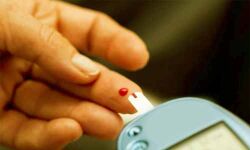- Home
- Medical news & Guidelines
- Anesthesiology
- Cardiology and CTVS
- Critical Care
- Dentistry
- Dermatology
- Diabetes and Endocrinology
- ENT
- Gastroenterology
- Medicine
- Nephrology
- Neurology
- Obstretics-Gynaecology
- Oncology
- Ophthalmology
- Orthopaedics
- Pediatrics-Neonatology
- Psychiatry
- Pulmonology
- Radiology
- Surgery
- Urology
- Laboratory Medicine
- Diet
- Nursing
- Paramedical
- Physiotherapy
- Health news
- Fact Check
- Bone Health Fact Check
- Brain Health Fact Check
- Cancer Related Fact Check
- Child Care Fact Check
- Dental and oral health fact check
- Diabetes and metabolic health fact check
- Diet and Nutrition Fact Check
- Eye and ENT Care Fact Check
- Fitness fact check
- Gut health fact check
- Heart health fact check
- Kidney health fact check
- Medical education fact check
- Men's health fact check
- Respiratory fact check
- Skin and hair care fact check
- Vaccine and Immunization fact check
- Women's health fact check
- AYUSH
- State News
- Andaman and Nicobar Islands
- Andhra Pradesh
- Arunachal Pradesh
- Assam
- Bihar
- Chandigarh
- Chattisgarh
- Dadra and Nagar Haveli
- Daman and Diu
- Delhi
- Goa
- Gujarat
- Haryana
- Himachal Pradesh
- Jammu & Kashmir
- Jharkhand
- Karnataka
- Kerala
- Ladakh
- Lakshadweep
- Madhya Pradesh
- Maharashtra
- Manipur
- Meghalaya
- Mizoram
- Nagaland
- Odisha
- Puducherry
- Punjab
- Rajasthan
- Sikkim
- Tamil Nadu
- Telangana
- Tripura
- Uttar Pradesh
- Uttrakhand
- West Bengal
- Medical Education
- Industry
Prestroke Blood sugar control lowers disability risk in Diabetics undergoing thrombectomy

Prestroke blood sugar control with a target HbA1c of ≤7.0% is beneficial for neurological recovery in diabetes patients undergoing intra-arterial thrombectomy (IAT) for large vessel occlusive stroke, a recent study has found. This benefit was independent of stroke subtype, occlusion site, bridging intravenous thrombolysis, degree of recanalization, and treatment period.
The study is published in Diabetes Care, the journal of the American Diabetes Association.
High blood sugar during the acute stroke period is associated with infarct progression, symptomatic hemorrhage, and decreased recanalization after recombinant tissue plasminogen activator administration and, thus, results in poor functional outcomes Higher levels of glycated hemoglobin (HbA1c) increase the risk of neurological deterioration, mortality, and poor neurological recovery after ischemic stroke .
To evaluate the association of prestroke glucose control with functional outcomes in patients with acute large vessel occlusive stroke and diabetes who underwent intra-arterial thrombectomy (IAT), Jun Young Chang, Asan Medical Center, University of Ulsan College of Medicine, Seoul, Korea, and colleagues included patients with emergent large vessel occlusive stroke with diabetes who underwent IAT between January 2009 and March 2020 from the Clinical Research Center for Stroke–Korea registry. They assessed the association between the HbA1c level at admission and functional outcomes (modified Rankin Scale at 3 months after the index stroke).
A total of 1,351 patients were analyzed.
The research yielded the following findings:
- Early neurological deterioration was more common in patients with higher levels of HbA1c at admission than in those with lower HbA1c levels.
- Higher HbA1c levels at admission were significantly associated with decreased odds of favorable functional outcomes at a threshold of 7.0–7.1%.
- The association was consistently observed in subgroups divided according to age, sex, stroke subtype, occlusion site, degree of recanalization, thrombolysis modalities, time from symptom onset to groin puncture, and treatment period.
"Prestroke glucose control with a target HbA1c of ≤7.0% may be beneficial for neurological recovery in patients with diabetes undergoing IAT for large vessel occlusive stroke, regardless of stroke subtype, bridging intravenous thrombolysis, occlusion site, degree of recanalization, and treatment period," the researchers wrote.
Better prestroke blood sugar control was associated with disability free functional recovery in patients with diabetes receiving endovascular therapy for large vessel occlusive stroke. Pre stroke glucose control with a target HbA1c#7.0% (53 mmol/mol) may have beneficial effects on neurological recovery after stroke and subsequent IAT regardless of stroke subtype, bridging IVT, occlusion site, degree of recanalization,and treatment period. However, excessive glucose control with anHbA1c #6.1% (43 mmol/mol) may reduce the chance of neurologic recovery and, therefore, should be avoided. IAT for large vessel occlusive stroke is also beneficial in diabetes. The current study emphasizes the importance of optimal prestroke glucose management among patients with diabetes to maximize the benefits of IA.
Reference:
The study titled, "Prestroke Glucose Control and Functional Outcome in Patients With Acute Large Vessel Occlusive Stroke and Diabetes After Thrombectomy," is published in the journal Diabetes Care.
DOI: https://care.diabetesjournals.org/content/early/2021/08/09/dc21-0271
Dr Kamal Kant Kohli-MBBS, DTCD- a chest specialist with more than 30 years of practice and a flair for writing clinical articles, Dr Kamal Kant Kohli joined Medical Dialogues as a Chief Editor of Medical News. Besides writing articles, as an editor, he proofreads and verifies all the medical content published on Medical Dialogues including those coming from journals, studies,medical conferences,guidelines etc. Email: drkohli@medicaldialogues.in. Contact no. 011-43720751


